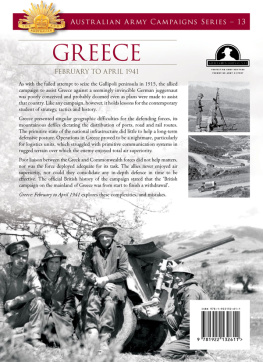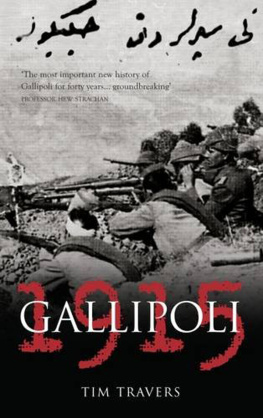
Copyright Army History Unit
Campbell Park Offices (CP2-5-166)
Canberra ACT 2600
AUSTRALIA
(02) 6266 4248
(02) 6266 4044 fax
Copyright 2011 Commonwealth of Australia
First published 2014
This book is copyright. Apart from any fair dealing for the purposes of private study, research, criticism or review as permitted under the Copyright Act, no part may be reproduced, stored in a retrieval system or transmitted in any form or by any means, electronic, mechanical, photocopying, recording or otherwise, without written permission.
See National Library of Australia for Cataloguing-in-Publication entry.
ISBN: 978-1-922132-61-1
Published by Big Sky Publishing, Sydney
Cover and typesetting by Think Productions, Melbourne
Printed in China through Asia Pacific Offset Limited
Front cover and title page: Retreating Greek forces. AWM 007945.
Back cover background: Australian anti-tank gunners resting, soon after their withdrawal from the Vevi area. AWM 007647.
Back cover top right: Members of 6 Div serving an A/A gun. AWM P01166.008.
Back cover bottom right: Roads (north of Ptolenais). AWM 07630.
CONTENTS
In 2004, the then Chief of Armys Strategic Advisory Group (CASAG), the Armys senior generals, established a scheme to promote the study and understanding of military history within the Army. The focus was the Armys future generation of leaders and, from this, the Campaign Series was created. The series is intended to complement the Armys other history publications, which are major analytical works of high quality, academically rigorous and referenced.
The Campaign Series focuses on leadership, command, strategy, tactics, lessons and personal experiences of war. Each title within the series includes extensive visual sources of information maps, including specifically prepared maps in colour and 3D, specifically commissioned artwork, photographs and computer graphics.
Covering major campaigns and battles, as well as those less known, the Army History Unit and its Campaign Series provides a significant contribution to the history of the Australian Army and an excellent introduction to its campaigns and battles.
Roger Lee, Army Historian
As with the failed attempt to seize the Gallipoli peninsula in 1915, the allied campaign to assist Greece against a seemingly invincible German juggernaut was poorly conceived and probably doomed even as plans were made to assist that country. Like any campaign, however, it holds lessons for the contemporary student of strategy, tactics and history.
Greece presented singular geographic difficulties for the defending forces, its mountainous defiles dictating the distribution of ports, road and rail routes. The primitive state of the national infrastructure did little to help a long-term defensive posture. Operations in Greece proved to be a nightmare, particularly for logistics units, which struggled with primitive communication systems in rugged terrain over which the enemy enjoyed total air superiority.
Poor liaison between the Greek and Commonwealth forces did not help matters, nor was the force deployed adequate for its task. The allies never enjoyed air superiority, nor could they consolidate any in-depth defence in time to be effective. The official British history of the campaign stated that the British campaign on the mainland of Greece was from start to finish a withdrawal.
NOTE ON TERMINOLOGY:
In this book, Australian formations are given their titles (6th Division, 19th Brigade). Allied formations alongside which they fought are generally given a national designator (1st British Armoured Brigade, 2nd New Zealand Division, 12th Greek Infantry Division), except where the national identification is obvious (Epirus Army, the three Macedonian armies). German unit and formation titles are in Italics, as are the names of all ships, of either side. Non-English terms are also in Italics.
I am indebted to Mark Wahlert and cartographer Eric Olason for their support in illustrating the text with a lavish array of diagrams, photographs and maps. Denny Neave and his staff at Big Sky Publishing have produced another exemplar of their trade. Roger Lee, head of the Army History Unit and Andrew Richardson, provided their usual support and guidance for this project. I am most grateful to John Donovan, who edited my manuscript. His suggestions did much to ensure that this material evolved into a clear and flowing narrative. As the author of course, I remain responsible for any omissions or errors of fact.
Michael Tyquin
Canberra, 2014
Like most wars and military operations, the Greek campaign was the result of political decisions. These were not always made with military strategies in mind, but commanders are obliged to meet the requirements of government policy and their leaders whims. This was true in 1941 for both the allies and the Axis powers.
As on Gallipoli 26 years before, the allied operation in Greece was poorly conceived and ended in an ignominious defeat. However, unlike the static campaign that played out on the Gallipoli peninsula, Greece was effectively one long withdrawal, and therefore a highly mobile operation. As on Gallipoli, what could have ended in a disaster ultimately resulted in the successful evacuation of the allied forces (but with the loss of much of their equipment).
Before looking at the military aspects of the campaign in Greece it is important to understand why British and Commonwealth forces were sent there.
BRITISH DIPLOMACY
After Adolf Hitlers occupation of Czechoslovakia in March 1939, Britain gave Greece and Turkey assurances of military aid should they be invaded. This was followed by a joint declaration by Britain and Turkey on 12 May 1939 that, in the event of aggression leading to war, the two countries would aid each other mutually.
It remained a key British foreign policy objective to secure such a pact because Turkish cooperation was considered vital, not only because of military and geographical factors, but also because she might be able to influence other countries to make a stand against the Axis powers: Nazi Germany and fascist Italy. In the event, Egypt decided not to declare war on Italy, and Iraq did nothing.
Winston Churchill, who became prime minister of Great Britain on 10 May 1940, was concerned that if Greece fell, then Turkey would be occupied. This could open another front, which would threaten both the Mediterranean and the Middle East. British diplomacy therefore sought to build up a Balkan league of Yugoslavia, Greece and Turkey to provide a second European front. Unfortunately, British estimates of the military capacity of these countries were totally unrealistic. Most political histories of this period point out that British foreign policy in the Balkans was also unjustifiably optimistic.
On 1 July 1940 Romania denounced the Anglo-French guarantee, while other neutral countries were influenced by the seeming invincibility of German arms. Nevertheless, British policy continued to aim at stronger links with Greece and Turkey, although little specific help could be promised when these countries were in ever-growing need of reassurance.
ADOLF HITLER FHRER OF GERMANY
Adolf Hitler become one of the most dominant and destructive figures of the 20th century. Hitler initiated the Second World War in a bid to transform Germany into the strongest European power and to vanquish the disgrace of its defeat in the First World War. The result was six years of global violence and racial extermination that almost witnessed the triumph of dictatorship over democracy. Born in Austria in 1889, Hitler moved to Munich in 1913. After the outbreak of the First World War he enlisted in the German Army, serving in a Bavarian regiment. He rose to the rank of lance corporal and was awarded the Iron Cross.












